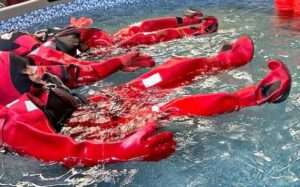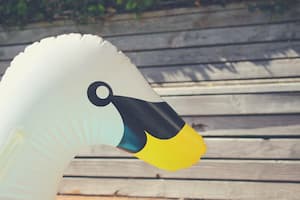
Alaska Sea Grant and Bristol Bay Regional Career and Technical Education (BBRCTE) teamed up to lead a new two-week hands-on training program for high school-aged prospective commercial fishers. The Commercial Fishing Vessel Services and Maintenance intensive training program was informed by the Food from the Sea project, a needs assessment conducted in 2021–2022, showing that for new commercial fishers, the most important training needs were in the areas of safety, vessel maintenance and repair, and crew/deckhand skills. Students were able to earn up to four college credits for completing the training.
“Alaska Sea Grant has been teaching and facilitating classes for fishers for years,” noted instructor Tav Ammu, Alaska Sea Grant Marine Advisory Program agent for Bristol Bay. “Teaming up with BBRCTE helps us focus on the next generation of fishermen when there is a prime opportunity to develop a solid fishing foundation.”
The course started with Alaska Sea Grant’s Crew Class, covering topics applicable to a variety of fishing gear. The first section consisted of knot tying, net mending, and fish picking, including a discussion of fish quality and the importance of proper handling and care. The Alaska Marine Safety Education Association’s Onboard Drill Conductor Training trained students in safety, including donning survival suits, lighting signal flares, and putting out fires. Next up was an introduction to boatwork, where students received robust equipment safety training and got to practice using a variety of tools employed in the industry—for example, torquing bolts until they broke and then using extraction tools to pull them out. The final two days of the first session focused on marine propulsion, the operation and maintenance of diesel and gas engines, and included taking apart and reassembling components of both types of engines.
The second week of training was held the following month, starting with DC electrical theory and how to properly size wires and components. Students applied this knowledge in a series of activities, including wiring critical boat operation and safety systems to a battery power source. Next was training on refrigeration equipment, where students learned to operate the marine refrigerated seawater systems common aboard Alaska’s commercial fishing vessels for preserving catch.
Most fishing vessels are powered by hydraulics, so students learned about pressure and flow by building circuits and wrenching on hydraulic pumps and motors. The group finished the week with marine First Aid and business planning.
Many students shared that they appreciated the hands-on emphasis of the training and were going to use the skills immediately in their fishing operations.
“The purpose of the Vessel Services and Maintenance curriculum is to expose Bristol Bay youth to the operational components of a commercial fishing vessel that they may not otherwise be exposed to,” said Misa Webber, BBRCTE program leader and a developer of the intensive. “We had a combination of students who had no experiences with salmon, students who participate in the annual subsistence harvest, and students with years of crewing under their belt. [Alaska Sea Grant’s] Tav and Gabe [Dunham] developed an extraordinary course where all of these skill levels could meet in front of a fire extinguisher, or alternator, or a bilge pump, and all collectively acquire more knowledge.”
The intensive, which is planned to be offered again through BBRCTE in early 2025, also fulfills several of the required components of Alaska Sea Grant’s Commercial Fishing Apprenticeship Program. One of several regional fishing apprenticeship projects by Alaska Sea Grant, the Bristol Bay program is a 4-year tiered training that develops a fisher from novice up to the skill level of co-captain, through a combination of classroom and on-the-job training. Having the Commercial Fishing Vessel Services and Maintenance intensive seamlessly integrate with the apprenticeship program helps provide an additional pathway to address the aging of the Alaska commercial fishing fleet and ensure Bristol Bay residents can continue to fish the largest sockeye salmon run in the world.
“It is essential that we continue to provide fisheries education opportunities in Bristol Bay to give the confidence to local and indigenous youth that this is their fishery, and given the right toolbox, they too can invest in this most magnificent industry,” added Webber.
[content id=”79272″]






